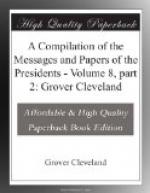In some instances the State governments have attacked and suppressed these evils, but in others they have been unable to afford adequate relief because of the jurisdictional limitations which are imposed upon them by the Federal Constitution.
The question how far the National Government may lawfully interfere in the premises, and what, if any, supervision or control it ought to exercise, is one which merits your careful consideration.
While we can not fail to recognize the importance of the vast railway systems of the country and their great and beneficent influences upon the development of our material wealth, we should, on the other hand, remember that no individual and no corporation ought to be invested with absolute power over the interest of any other citizen or class of citizens. The right of these railway corporations to a fair and profitable return upon their investments and to reasonable freedom in their regulations must be recognized; but it seems only just that, so far as its constitutional authority will permit, Congress should protect the people at large in their interstate traffic against acts of injustice which the State governments are powerless to prevent.
In my last annual message I called attention to the necessity of protecting by suitable legislation the forests situated upon the public domain. In many portions of the West the pursuit of general agriculture is only made practicable by resort to irrigation, while successful irrigation would itself be impossible without the aid afforded by forests in contributing to the regularity and constancy of the supply of water.
During the past year severe suffering and great loss of property have been occasioned by profuse floods followed by periods of unusually low water in many of the great rivers of the country.
These irregularities were in great measure caused by the removal from about the sources of the streams in question of the timber by which the water supply had been nourished and protected.
The preservation of such portions of the forests on the national domain as essentially contribute to the equable flow of important water courses is of the highest consequence.
Important tributaries of the Missouri, the Columbia, and the Saskatchewan rise in the mountain region of Montana, near the northern boundary of the United States, between the Blackfeet and Flathead Indian reservations. This region is unsuitable for settlement, but upon the rivers which flow from it depends the future agricultural development of a vast tract of country. The attention of Congress is called to the necessity of withdrawing from public sale this part of the public domain and establishing there a forest preserve.
The industrial exhibitions which have been held in the United States during the present year attracted attention in many foreign countries, where the announcement of those enterprises had been made public through the foreign agencies of this Government. The Industrial Exhibition at Boston and the Southern Exposition at Louisville were largely attended by the exhibitors of foreign countries, notwithstanding the absence of any professed national character in those undertakings.




